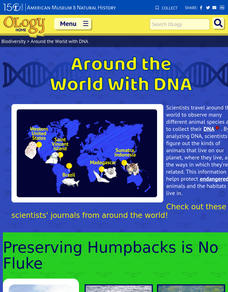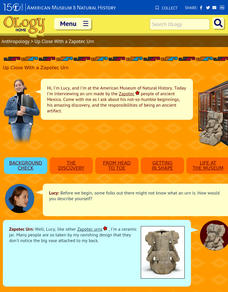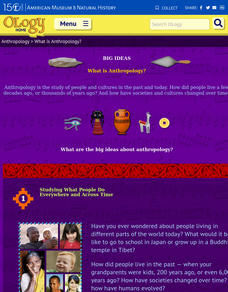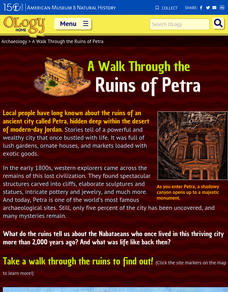American Museum of Natural History
Ask a Scientist About Our Environment
Scientists respond to 26 question posed by learners. These experts answer in easy to understand language, include photos to illustrate the issue, offer suggestions for how young people can make a difference, and supply links to resources...
American Museum of Natural History
Bio-Benefits
Kick-start a discussion of the importance of biodiversity with a colorful resource that touts the benefits of maintaining healthy ecosystems. The images stress the interdependence of all the elements of an ecosystem.
American Museum of Natural History
Cuban Wildlife Matching Game
Young biologists match Cuban wildlife to their ecosystems by dragging images of the creatures to either a forest, coral reef, cave, or wetland habitat.
American Museum of Natural History
Around with World with DNA
A mammalogist, ornithologist, ichthyologist, and a conservation geneticist share their work and their hopes that their research will help protect and save endangered species and their habitats.
American Museum of Natural History
Mint Your Own Coin
Provide young archaeologists with an opportunity to craft their own artifacts. The step-by-step directions in an engaging resource show them how to mint their own coin, complete with image, date, and motto.
American Museum of Natural History
What's This?: Mythic Creatures
Fantastic beasts, and where to find them, are featured in a resource that offers images of real animals that just might have given rise to some of mythic creatures of legend.
American Museum of Natural History
What's This?: Early Humans
Early humans crafted shelters out of whatever materials they could find. A one-question quiz asks learners to identify the type of bones used to construct the hut pictured in a display.
American Museum of Natural History
Make Your Own Paper
Paper, paper everywhere. Paper is so prolific that few think about where the idea for it originated and how it is made. Introduce young readers to the paper-making process with an activity that lets them create their own.
American Museum of Natural History
Piecing It All Together
Archaeology digs are much like giant jigsaw puzzles. The artifacts found are often in pieces and scientists must reconstruct them. A hands-on activity lets young archaeologists experience this facet of the job as they create, smash, and...
American Museum of Natural History
Map Your Own World
Young archaeologists practice their mapping skills by creating a detailed site map of their room or another room in their home. After indicating walls, windows, doors, and closets, they add furniture and objects, labeling each item.
American Museum of Natural History
Mythic Creatures Challenge
Mythic creatures and where to find them is the subject of an engaging interactive resource. Young anthropologists click on a bright red X on a world map to see an image of and learn the stories of 15 legendary creatures.
American Museum of Natural History
Making a Field Journal
Trowels and brushes are certainly important tools for an archaeologist working on a dig. Perhaps more important, however, is the archaeologist's field journal. Christina Elson, an archaeologist working with the American Museum of Natural...
American Museum of Natural History
Being an Archeologist: Chuck Spencer
Meet Chuck Spencer, an archeologist who studies the Zapotec people who lived in the Valley of Oaxaca, Mexico over 2000 years ago. Spencer shares in print his response to questions posed by kids.
American Museum of Natural History
Sounds of the Silk Road
Young explorers may not be able to travel the Silk Road but they can listen to music that was played on instruments of the time and create their own songs with the help of an interesting interactive resource.
American Museum of Natural History
Up Close With a Zapotec Urn
If a Zapotec urn, buried for over a thousand years in a temple in the lost city of Xoxocotlan in the Valley of Oaxaca in the mountains of southern Mexico could talk image the stories it could tell. That's the set up in a clever resource...
American Museum of Natural History
Being a Zoologist: Sandra Olsen
Are your students wild about horses? Then introduce them Sandra Olsen, a zooarchaeologist, who has been studying horses and the people who herd them. Ms Olsen responds to 15 interview questions and details how she goes about her...
American Museum of Natural History
What is Anthropology
A colorful resource introduces learners to the four major fields of anthropology: cultural anthropology, linguistic anthropology, biological anthropology, and archaeology. Explanations are provided for what each field studies, the kinds...
American Museum of Natural History
Inca Investigation
A fascinating interactive resource lets young archaeologists dig through the history of Huanuco Pampa. The Inca city, located high in the Andes mountains of Peru, was once a thriving community. Craig Morris has spent years researching...
American Museum of Natural History
A Walk Through the Ruins of Petra
Walking through the ancient Nabataean city of Petra can be a challenge. A tour begins with a 20-minute walk down a rocky slope through the narrow Siq to get to the famous Treasury known to Indiana Jones fans. But that is just the...
American Museum of Natural History
The Ancient City of Petra
Anyone who has seen Indiana Jones and the Last Crusade will recognize the entrance to the Nabataean city of Petra. Young archaeologists don't need horses or camels to travel through the Sig and tour this fascinating city, however. With...
American Museum of Natural History
If Trash Could Talk
Trash can talk! Young archaeologists dig through their trash to see what it reveals about their lives. After they examine their midden, links permit users to test their knowledge of archaeology with a 10-questions quiz, learn how...
American Museum of Natural History
Dress Up a Horse
Walk, trot, gallop! Young equestrians have an opportunity to learn all about horses with an engaging resource that lets them select tack to dress up a horse, create flip books that illustrate the various gates, have questions answered by...
American Museum of Natural History
Being An Anthropologist: Laurel Kendall
Imagine studying Korean culture, especially the role of women, as well as marriage and religious rituals from home! Anthropologist Laurel Kendall shares what she has learned from her many trips to this fascinating country half a world away.
American Museum of Natural History
Silk Road Fables
Talk about rabbit holes! With just this one resource, learners can travel the Silk Road listening to fables, meet a scientist who studies poisons (and whose favorite book is Alice in Wonderland), and listen to a video interview of an...

























